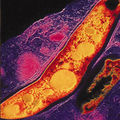Obsessive-compulsive rhyming disorder
"Yo yo yo, Doc, my back be hurtin'
That's the main symptom, and I be certain
I gots too much pain to even be flirtin'
Gimme muscle relaxants, and lemme put my shirt on."
~ A gangsta on back pain and OCRD, and attempts to explain it fruitlessly
Obsessive-compulsive rhyming disorder is a psychiatric disorder, like that of a obsessive hoarder, most often found north of the US-Mexico border. Known in short form as OCRD as well as by those with ADD, it is characterized by distressing, intrusive thoughts that may leave one’s stomach tied up in knots. Sufferers neutralize these obsessions by creating lyrical successions that, at least in part, resemble a rhyme or poem of the heart. As a disorder marked by anxiety, some believe patients to be crazy, yet they’re really as normal as you or me (except for their rhyming and literary timing).
Explanation
Despite the nature of the disease, the diagnosis is found with relative ease. A doctor examining his patient’s mind would be most certainly inclined to see if his patient aligns with any of the following signs:

Indications of obsessions:
- Thoughts that are sudden and unprovoked that cause the patient to feel like they're choked, such as the image of a man who is cloaked, being uncomfortably poked, or being stifled in a room full of smoke.
- These thoughts have no basis in real life, but still cause considerable strife.
- Ignorance or suppression is the way the patient deals with this obsession. As described by Professor Grant Ignation, some sufferers also use thought supplantation.
- Patients recognize these thoughts are only in their mind, but find themselves unable to deal with them in kind.
- The disorder often entails a preoccupation with small details, which, in many a case, cause the mind to race. (This is usually in a manner non-Amazing, despite possibly suggestive phrasing.)
Indications of compulsions:
- In this specific illness, repetitive rhymes ease patients' stress. Not avoiding using a public loo or washing of hands after tying a shoe; only rhyming will do.
- The assonance has nothing to do with the object of avoidance. However, their neutralization of distress often has them regress into a state of excess.
For this to be considered a problem, though, the times these criteria are enough are seldom. In addition to these indications, the obsessions or rhymes must take up considerable amounts of time, cause distress or social duress, or heightened school and/or work-related stress. Sufferers may also seem depressed, as in the case of Rudolf Hess.
Causation
The disorder's source has been disputed without remorse. In the Middle Ages, it was thought to be linked to Satan; the cure was thus exorcism, often prescribed in Catholicism. Scientists now have the opinion, agreed upon highly, that the source is more likely Bill O'Reilly.
However, in recent times, other explanations have been offered for the rhymes. Dr. Heidi Schuss has suggested a link to over-reading of Dr. Seuss, or even being kicked in the head by a moose. She also claimed damage to the brain could be caused by water from Chernobyl, Ukraine. Despite her defiance, she is generally confined to pseudoscience.
Symptoms and signs
Ryming about your dogs
- Rhyming about the tsar
- Then rhyming about Lenin
- And about who let the dogs in
- Especially if they are poodles
- Or resemble a child's doodles
- Thinking of doodles, then thinking of Seuss
- And wondering what he would write about juice:
“I may not like green eggs and ham, and will not eat them, Sam-I-Am, but I will gladly drink this heavenly juice! It tastes like it was juiced by Zeus! Allow me to propose a truce: you give me enough juice to fill to the brim a train's caboose, and I will give you back your goose.”
– Dr. Seuss on Dr. Seuss
- Er, um...agh, I'm dumb! Where was I on this list? Oh man, my editor's going to be pissed...unless he doesn't notice my incompetence. Hence, promise not to tell anyone, and you will earn six pence.
Demographics and statistics of the OCRD kind

OCRD is more common in women than in those of the male sex, a statistic that leaves many researchers perplexed. Then again, this stat may simply result from misreading of text.
The next observation that leaves scientists vexed is this question's answer: Are OCRD sufferers smarter? Some studies have shown a link, asserting that, to rhyme, one must think. (Quite deeply, stated specifically.) These studies, nonetheless, have been subjected to controversy on the grounds that the researching company was motivated commercially; to be precise, a rhyming dictionary, edition concise, was the main product of the enterprise, a conflict of interest of immeasurable size. The results must therefore be taken with skepticism to avoid statement as fact, thereby causing a schism.
Treatments and cures for the disorder
Quite unfortunately, no cure has been isolated for OCRD, and no fully effective treatment exists; thus, the disorder can only be allowed to persist. This does not however prevent normal lives: in children's books and poetry, one with OCRD can thrive. Dr. Seuss and Lewis Carroll are the two most common models for this assertion, since they can be thought of without overexertion. These two men are also interesting as they invented words to help their rhyming. While this example may be ample adaptation for many patients, regular conversation may lead to misinterpretation when one uses words like "flangtabulation". Thus, while it is unique, not everyone likes this technique.
Many kinds of medication, homeopathic formulations, and even radiation have had potential applications tested for this malformation. Results were inconclusive, rendering a cure elusive. However, it can be said with certainty that some methods have no efficacy. Patients are not helped by abortifacients, men benefit not from acetaminophen, and nothing gained by women who try root of citrus limon. As well, Coke with bark of oak's a sick joke spread by some bloke, and, if left to soak, ingestion can provoke a stroke or the response to choke, then croak, and their family to go broke buying mourning cloaks. A warning slogan was spoken and spread among the folk: "Don't do Coke and oak, unless you're James Polk. Which you're not, idiot."
In extraordinary cases, though, where the patient faces difficulty in living normally or where the meter and verse seem to be getting worse, there are other ways to work around the disorder and get patients' lives back in order. Consider a case so progressed that the patient has digressed into even writing in poesy when simply going to shop for groceries:
- To buy today at IGA:
- 1 pint of 2-percent milk
- 4 chocolate pudding cups
- 1 bolt Arabian shot silk
- 2 white-furred seal pups
The patient may feel defeated by the quite mammoth chore of finding seal pups and Arabian silk in a local store. The attending physician or ninja-witchdoctor, given time, might encourage the patient to use slant rhyme:
- 1 pint of 2-percent milk
- 4 chocolate pudding cups
- 1 aquarium-raised whelk
- 1/4 pound macadamia nuts
Now, a whelk and some nuts are not as bad, but still they're not likely to make all shoppers glad. And what if the patient is allergic to nuts, or finds that the things just gripe their guts? The next suggestion to avoid derangement might be to use a little creative rearrangement:
- 1 pint of 2-percent milk
- 4 chocolate pudding cups
- 1 steak (not from an elk)
- And NO macadamia nuts
Granted, this is not a perfect solution, but it is still better than the other option.
Obsessive-compulsive alliterative disorder is a second sickness with similar symptoms. Diagnosis of the disorder isn't done differently, except for the fact that the first font figure in a fabricated file repeats relentlessly rather than rhyming remorselessly. People presenting peculiarities of both irregularities concurrently often disturbingly display dangerous dispositions toward death dealt by oneself.
Also see, if it would please thee
- Anything Grecian
- Rhyme
- Self-help sublime
- Crime
- Prime
- Dime
- Lime
- Pantomime
- All the time!
- Stay in line
- Step in time
- That didn't rhyme!
- Somethingsomething-ime!





